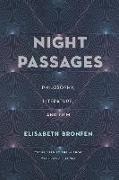Read more
In the beginning was the night. All light, shapes, language, and subjective consciousness, as well as the world and art depicting them, emerged from this formless chaos. In fantasy, we seek to return to this original darkness. Particularly in literature, visual representations, and film, the night resiliently resurfaces from the margins of the knowable, acting as a stage and state of mind in which exceptional perceptions, discoveries, and decisions play out. Elisabeth Bronfen investigates the nocturnal spaces in which extraordinary events unfold, and casts a critical eye into the darkness that enables the irrational exploration of desire, transformation, ecstasy, transgression, spiritual illumination, and moral choice. She begins with an analysis of classical myths depicting the creation of the world and then moves through night scenes in Shakespeare and Milton, Gothic novels and novellas, Hegel's romantic philosophy, and Freud's psychoanalysis. Bronfen also demonstrates how modern works of literature and film, particularly film noir, can convey that piece of night the modern subject carries within.
From Mozart's "Queen of the Night" to Virginia Woolf 's oscillation between day and night, life and death, and chaos and aesthetic form, Bronfen renders something visible, conceivable, and comprehensible from the dark realms of the unknown.
List of contents
List of IllustrationsPrologue: My Queen of the NightAcknowledgmentsIntroduction: Exile of the Star-Blazing Queen in The Magic FlutePart I. Cosmogonies of the Night1. Nyx and her Children2. "Let there be darkness!"3. Hegel's Night of the World4. Freud's Night Side of the SoulPart II. Night Talks5. Shakespeare's Night World6. Freud's Book of Dreams7. A Poetics of InsomniaPart III. Gothic Nights8. Moral Temptations of the Night9. Seeing the World Darkly10. Night's Doubles11. The Nocturnal FlaneurPart IV. Film Noir's Nights12. Return of a Hollywood Star13. Nocturnal Desire of the Femme fatale14. Into the Night15. Fate and ChancePart V. The Ethics of Awakening16. What Lies at the End of the Night17. George Eliot's Dawn18. Edith Wharton's Twilight19. Virginia Woolf's Nights and DaysBibliographyIndex
About the author
Elisabeth Bronfen is professor of English and American studies at the University of Zurich. Her numerous books include Specters of War: Hollywood's Engagement with Military Conflict; Over Her Dead Body: Death, Femininity, and the Aesthetic; The Knotted Subject: Hysteria and Its Discontents; and Home in Hollywood: The Imaginary Geography of Cinema.

